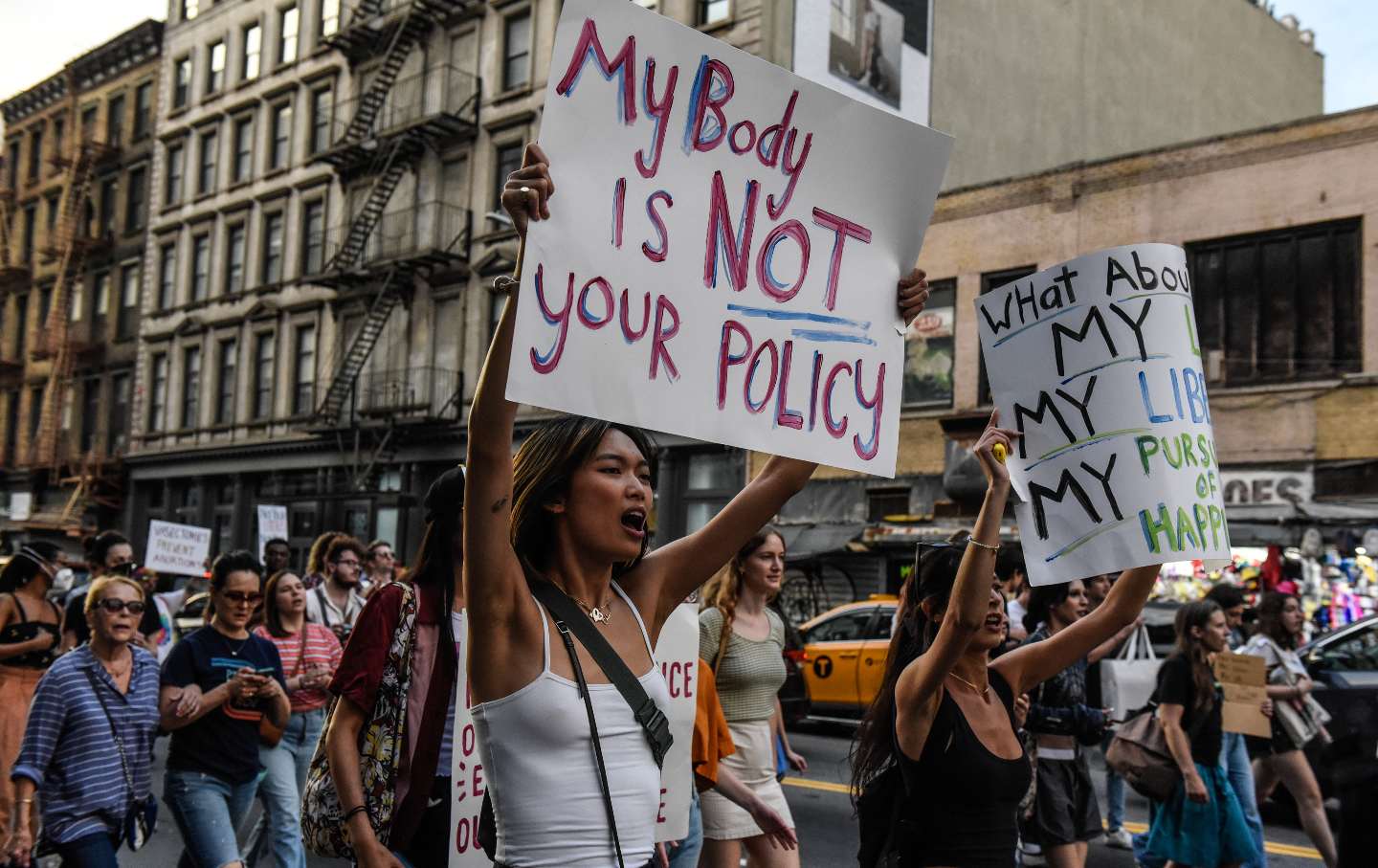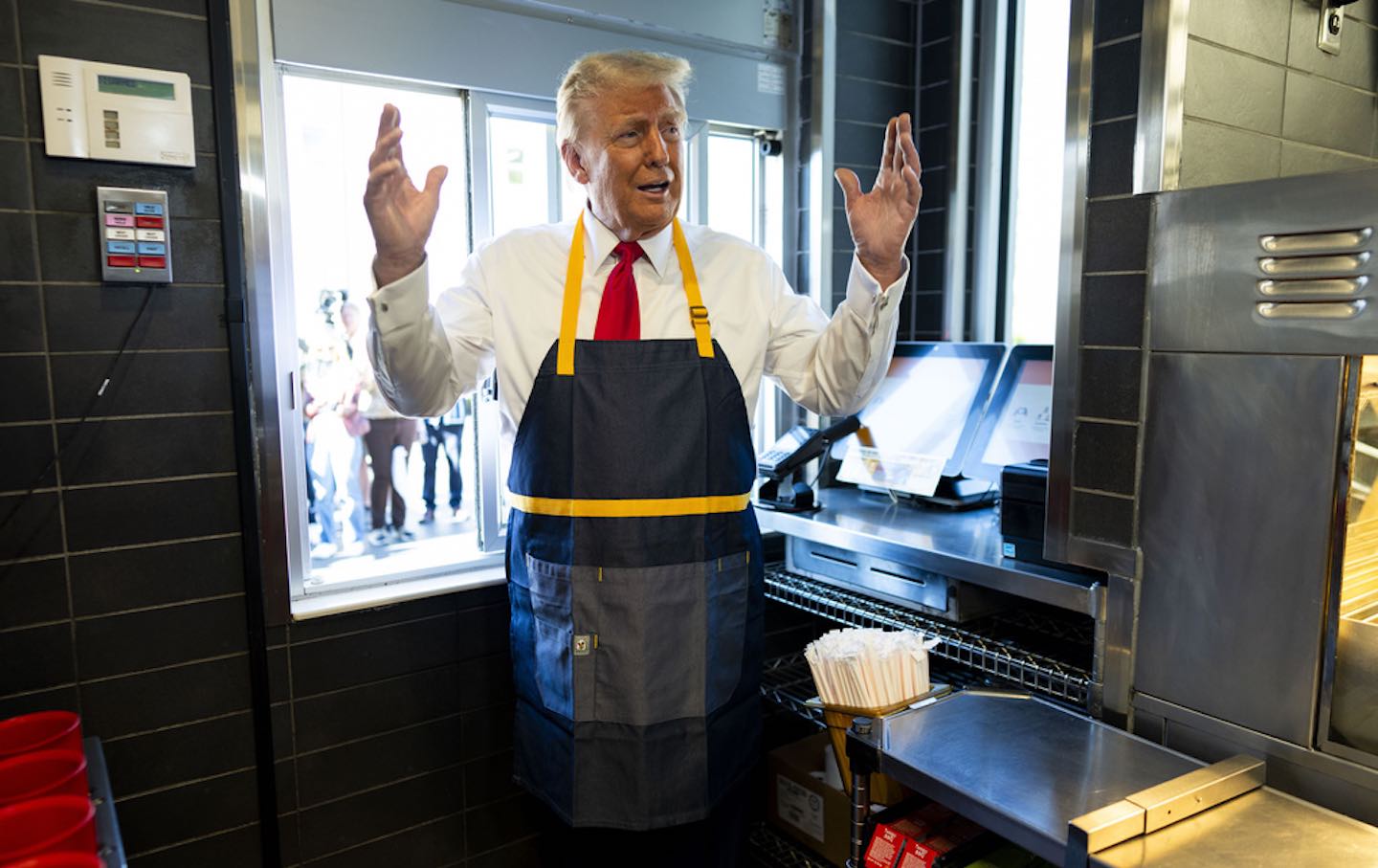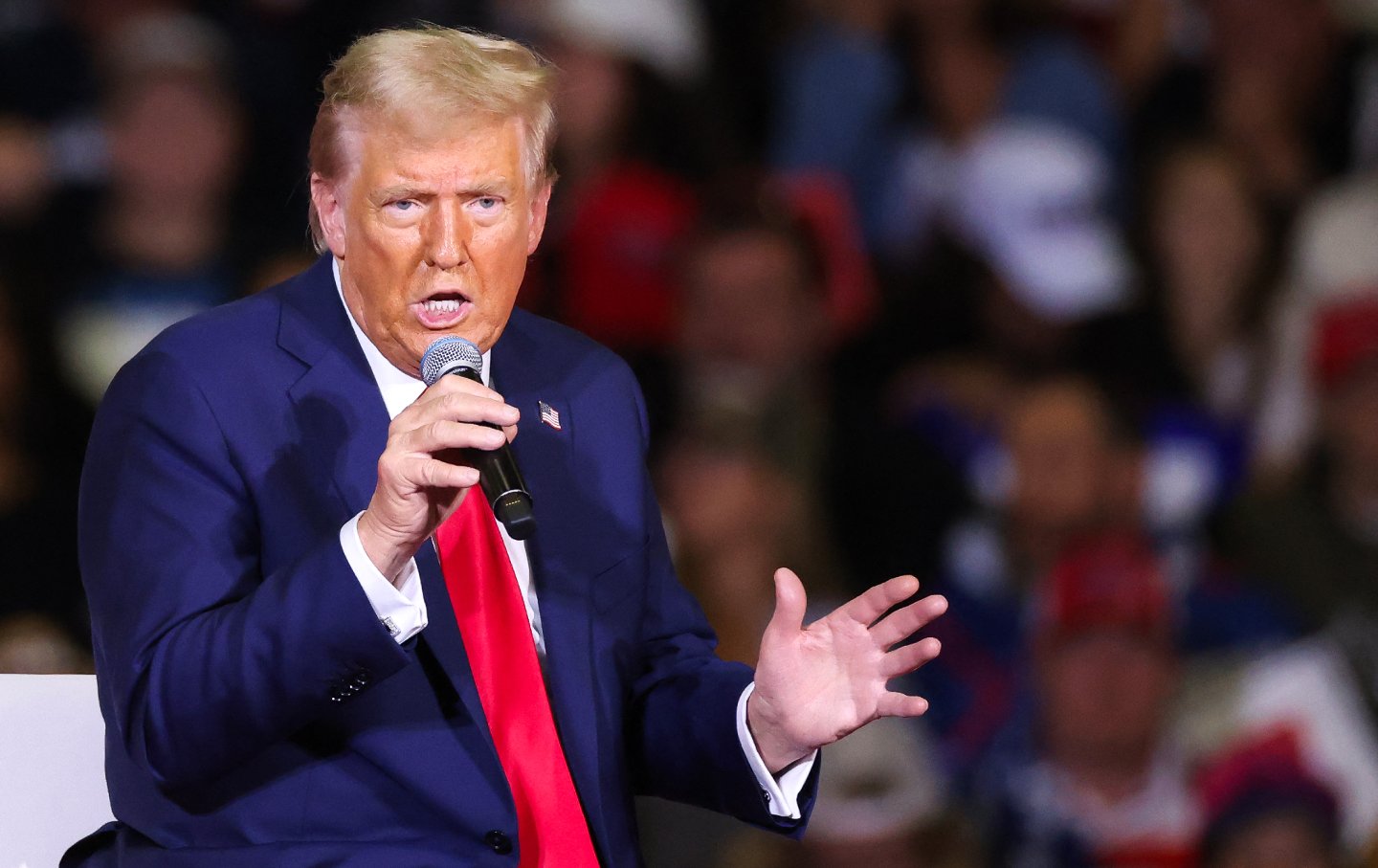Activism
/
StudentNation
/
October 22, 2024
Over 20 states already have a version of the ERA, but Prop 1 would also prohibit reproductive discrimination and codify abortion access in the state.

Abortion rights demonstrators march during a protest in New York.
(Stephanie Keith / Getty)
With less than two weeks until Election Day, fear of a national abortion ban is rampant. Currently, abortion before 26 weeks of pregnancy is legal in New York, but with the Supreme Court’s overturning of Roe v. Wade in 2022, a potential second Trump administration could nevertheless jeopardize reproductive access in the state.
For New Yorkers, “Proposal 1” is also on the ballot, which would create an amendment to the state Constitution, otherwise known as the Equal Rights Amendment (ERA), that makes discrimination unconstitutional on the basis of several characteristics, such as gender identity, disability, age, and sex.
Twenty-two states already have a version of the ERA in their state Constitution, including Nevada, which ratified the most inclusive version to date in 2022, outlawing discrimination on the basis of “race, color, creed, sex, sexual orientation, gender identity or expression, age, disability, ancestry, or national origin.” New York’s proposed ERA expands this threshold even further, and could triumph as the first to explicitly prohibit reproductive discrimination in terms of “pregnancy, pregnancy outcomes, and reproductive healthcare and autonomy.”
To “spell out reproductive rights access in such a robust way is really important,” said Ting Ting Cheng, the director of Columbia Law’s ERA Project, “and will have huge ripple effects” outside of New York.
The idea of an Equal Rights Amendment was first introduced in 1923 by feminist Alice Paul, who proposed that sex-based discrimination should be federally unconstitutional. A 101-year battle to nationally ratify the ERA followed, nearing success in the 1970s when the amendment received the needed two-thirds congressional approval as well as 35 out of the 38 states required on board.
However, in 1972, Congress set a seven-year deadline for the remaining three states—Illinois, Nevada, and Virginia. When those states did not ratify in time, the amendment failed and the movement fizzled out. But in 2016, Donald Trump’s election “reenergized” advocates to try to remove the deadline, said Belan Yeshigeta, a junior at Columbia University.
Current Issue

“Deadlines on amendments are strategies to prevent them from actually being added to the Constitution,” says Yeshigeta, the cofounder of the women’s rights organization Young Feminist Party. “The first time a deadline was put onto an amendment was the Prohibition Amendment. It didn’t even work.”
Yeshigeta started the Young Feminist Party (formerly known as Generation Ratify) in 2019 as a high school sophomore in Arlington, Virginia. While Yeshigeta’s work extends nationwide in support of the federal initiative, she finds the New York ERA particularly special due to the clause stating the ERA is not meant to limit or remove any existing or future protections of discrimination—meaning it’s not meant to override other equality-based legislation, but serve as the foundation for subsequent laws.
Some may see the push for the ERA as unnecessary in New York, as discrimination of race and religion are already unconstitutional. But New York City and New York State, in many ways, are distinct worlds. It was only two years ago that Kathy Hochul had just a 6 percent win over the anti-abortion advocate Lee Zeldin in the race for governor. And it wasn’t until 2019, on the 46th anniversary of Roe v. Wade, when New York finally removed abortion from the criminal code and passed the “Reproductive Health Act.”
It was also 2019 when New Yorkers for Equal Rights started their campaign—now made up of a coalition of over 500 organizations advocating for the ratification of the ERA. “We, at the time, knew that Roe v. Wade had been threatened for over 50 years and a Supreme Court could overturn our rights,” said Sasha Ahuja, the director of the campaign. Since 1970, abortion has been legal in New York, but the procedure is still not codified as a right. “We already have the benefit of living in a state that has protections against discrimination and protections for abortion in our loss. But here’s a reality, laws can be repealed at any time. The laws can be rolled back at any second. It’s so important that New Yorkers protect their rights, ensure that they are rock solid in our state’s strongest founding document.”
“New York could be a model, could be a leader in the country, and could create models of reproductive justice that other states could replicate,” said Isabella Grullon, a senior at Hunter College and a fellow for the New York Birth Control Access Project. And without a constitutional protection of reproductive rights, their work can only go so far. Even with historic legislation like the Birth Control Access Act, Grullon says, people seeking contraceptives at pharmacies are still vulnerable to discrimination. Technically, pharmacists could still deny that access. “When it comes to discrimination, reproductive and reproductive health care, New York isn’t blameless in this.”
To Ahuja, one of the biggest obstacles that stands in the way of the ERA is the lack of education many voters have about it. “Ballot measures are not something that voters often hear about until election day,” Ahuja said. “So we built the infrastructure to do this work early. We needed to make sure we took every step possible to elevate the importance and the urgency for all New Yorkers. We know that we’re doing what we can to educate voters about the importance of passing Proposal One, because historically, voters don’t, oftentimes get a ton of education.”
In May, the NY ERA was temporarily kicked off the November ballot, but was restored one month later by the New York Court of Appeals after the lawsuit filed to remove it, championed by Republican Assemblywoman Marjorie Byrnes, missed the deadline to bring up the challenge ahead of the election.
Two voters later sued the Board of Elections over the language of the ERA. As the amendment does not explicitly mention the words “abortion” or “LGBT,” the lawsuit argued that it violates New York’s recently introduced Plain Language Act, which rules that the wording of ballot questions should make their best efforts to be comprehensive on an eighth-grade reading level. In August, a judge did not rule in favor of changing the language, so the ballot, while slightly tweaked, still excludes the mention of abortion or LGBT.
Attempts to block the ERA haven’t stopped there. The New York State Republican Party officially opposes the ERA, while other organized efforts such as the Coalition to Protect Kids–NY has called it “Parent Replacement Act,” saying it would lead to the “erosion of parental rights and the dismantling of established protections for children.” Wayne D. Lewis Jr., the president of Houghton, a “Christ-centered liberal arts and science university,” released a statement on September 25 expressing concerns about the ramifications on parental rights, religious liberty, and female athletics. “I strongly encourage all New Yorkers, but New Yorkers of faith in particular, to not be misled by overly simplistic advocacy and talking points,” wrote Lewis.
Popular
“swipe left below to view more authors”Swipe →
If ratified, the Equal Rights Amendment would not just codify reproductive and abortion access. The ERA would increase measures to ensure that disabled and elderly residents would have the access to voting support they need. Domestic domestic abuse victims—especially women—will be able to have gender-based violence taken seriously in trial. There will be bolstered protections against discrimination when it comes to wages, hiring, and promotions.
“You don’t need to wonder if your representative or the candidate you’re voting for may or may not represent you once they’re in office,” Yeshigeta said. “I think candidates say a lot of things when they’re on the campaign trail, and don’t necessarily follow through on their promises to their constituents. The New York ERA will not let you down. They will do exactly what they say that they will do.”
Can we count on you?
In the coming election, the fate of our democracy and fundamental civil rights are on the ballot. The conservative architects of Project 2025 are scheming to institutionalize Donald Trump’s authoritarian vision across all levels of government if he should win.
We’ve already seen events that fill us with both dread and cautious optimism—throughout it all, The Nation has been a bulwark against misinformation and an advocate for bold, principled perspectives. Our dedicated writers have sat down with Kamala Harris and Bernie Sanders for interviews, unpacked the shallow right-wing populist appeals of J.D. Vance, and debated the pathway for a Democratic victory in November.
Stories like these and the one you just read are vital at this critical juncture in our country’s history. Now more than ever, we need clear-eyed and deeply reported independent journalism to make sense of the headlines and sort fact from fiction. Donate today and join our 160-year legacy of speaking truth to power and uplifting the voices of grassroots advocates.
Throughout 2024 and what is likely the defining election of our lifetimes, we need your support to continue publishing the insightful journalism you rely on.
Thank you,
The Editors of The Nation
More from The Nation

The former president has always pretended to identify with working-class voters. Yesterday, at a campaign stop in Pennsylvania, he pretended to be one of them.
Chris Lehmann

It took a reference to Arnold Palmer’s penis to get more mainstream reporters to tell it like it is. That’s progress.
Joan Walsh

Arab voters could swing the election in places like Michigan—and, if the 44th annual ArabCon convention was any indication, Harris has a huge mountain to climb.
Drew Nelles

Donald Trump’s richest supporter has been busy finding new ways to corrupt democracy.
Jeet Heer

Extreme weather events, pandemics, and other public emergencies have exposed a deep societal disease that has only grown worse after decades of neoliberal policies.
Rev. Dr. Liz Theoharis

Felecia Phillips Ollie DD (h.c.) is the inspiring leader and founder of The Equality Network LLC (TEN). With a background in coaching, travel, and a career in news, Felecia brings a unique perspective to promoting diversity and inclusion. Holding a Bachelor’s Degree in English/Communications, she is passionate about creating a more inclusive future. From graduating from Mississippi Valley State University to leading initiatives like the Washington State Department of Ecology’s Equal Employment Opportunity Program, Felecia is dedicated to making a positive impact. Join her journey on our blog as she shares insights and leads the charge for equity through The Equality Network.




